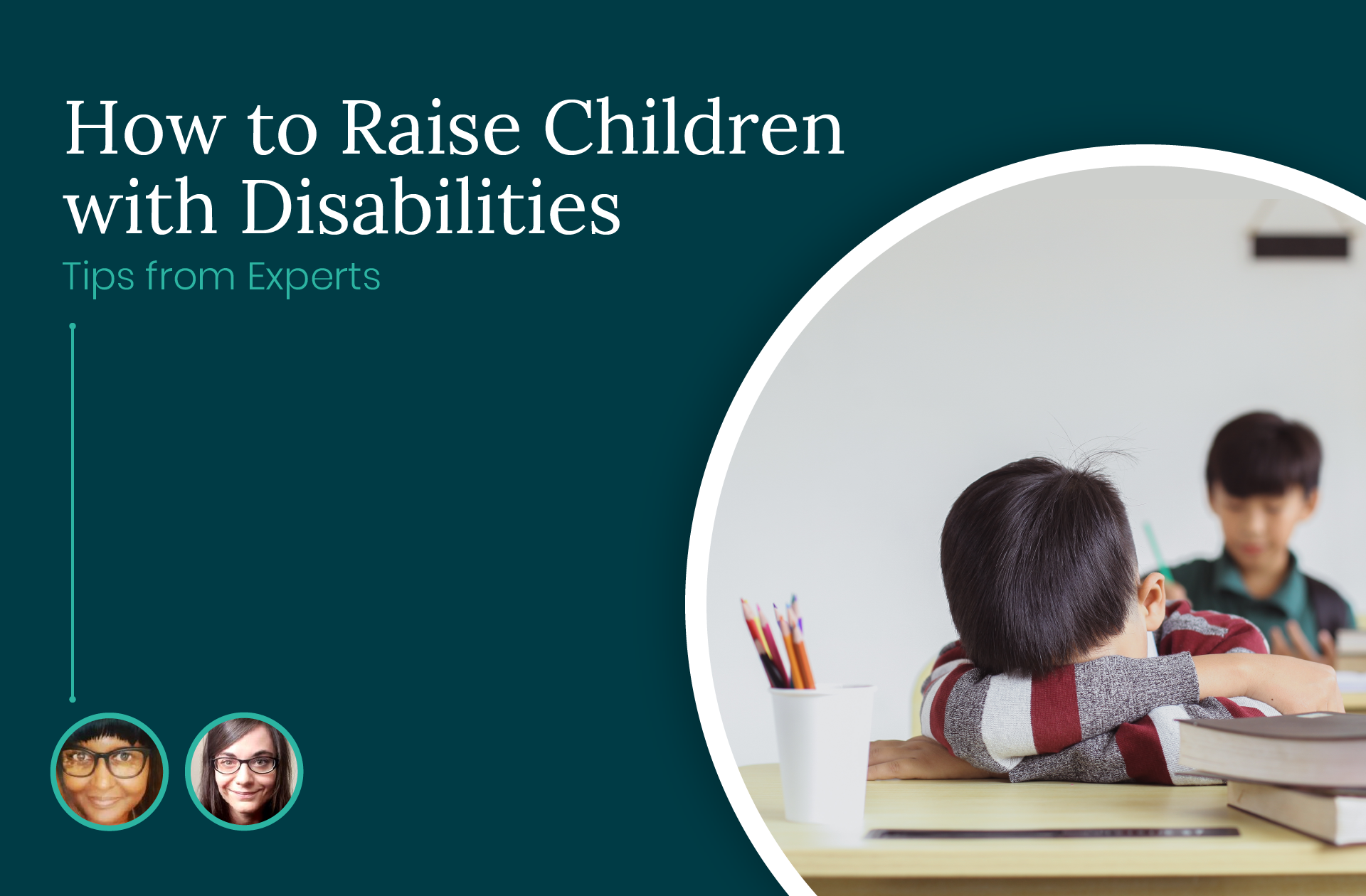Nov 14, 2022 in Life Coaching
How to Raise Children with Disabilities
Tips and advice from professionals.
It's your turn now! Let's support each other by clicking "Helpful".
+1

DISCUSS #Relationship
DISCUSS #Parenting
Many parents might feel as though they're alone in this struggle. However, children with learning disabilities are not uncommon.
Apart from learning disabilities, there are also other disabilities that kids are faced with. As a parent, we understand that coping with this is difficult.
You need to constantly remind yourself that this is not your fault and that you cannot cure these problems either. All you can do is be supportive, work through these problems and be a loving parent.
Your child will need to be nurtured from a young age. So, that your kid will grow up to be confident and also learn how to deal with these issues.
We also have invited Experts to shed some light on this matter and offer advice on raising children with disabilities. Read on to see their helpful tips and you can also book sessions with them if you feel you could benefit from speaking to a professional that can guide you through every step of your parenting journey.
Add to myWE:
Cami Daligand, Online Counselor who specializes in helping autistic children and adults gives advice and tips for raising unique children:
Create a Safe and Trusting Environment
As a parent, educator, or carer in a child’s life it is important to show the child you support them no matter what.

Focus on Strengths
Sometimes people focus too much on what a child can not do or where their weaknesses lie, it is so important to focus on their strengths and what they can do. Show them you can see their capabilities and strengths.
Praise their strengths and achievements regularly as well as encourage them to use their strengths. Using their strengths to build their self-esteem is a great way to help a child grow. This will help them with their own confidence if they can see that you believe in them.

Engage in What They Like
Try to encourage their personal interests in different areas of their lives for example if there is something they do not want to do, try to incorporate their interests or what they like to do to regain their motivation or intrigue in what you are presenting to them.
Use Visual Schedules
Structure and routine are important to help with anxiety and the feeling of uncertainty of what comes next.
Find a Strong Support System
Finding a solid support system for you and your child is very important. Join groups online and in-person (if possible), educate yourself as much as possible and speak to like-minded people in your community. This will help your own well-being which in turn will help your child.
Emily Lewis, Online Counselor who has been supporting families with disabled children also gives advice on this matter:
Being a Therapeutic Counsellor and living with multiple disabilities, my journey has been one of learning and growth. My experience of having my own children and supporting children in various capacities has allowed me to have hands-on experience in supporting families with disabled children.
Parents often ask me for ideas and tips for supporting their children with disabilities. This led me to put together some tips which I have found helpful for myself and the families I have supported.
Time Management
Supporting our children always needs some form of order and organization. One thing I feel that is most helpful is good time management. Families living with children with disabilities will notice that time is much more precious. Some everyday tasks which we can take for granted will need extra time. Extra time to prepare a meal, to assist your child to get dressed, time for domestic work and the care and supervision of your child and let’s not forget free time.
Having a structured timetable, whether it be in the form of a diary or day/week planner, knowing your daily, weekly, or monthly routine aids to bring order to what may usually feel like an uncontrolled time. For some children with disabilities routine and consistency play a big part in helping them to feel safe. Structure and planning encourage their ability to develop helpful learned behaviors which build confidence and self-esteem.
Good time management allows for the time to build better relationships with your child as you will include time to play and communicate as a family. All too often families can become overwhelmed with caring for their disabled child because all their time will be taken by the struggles of managing challenging behaviors or discourse which can occur within the family due to fatigue and lack of structure.
Building a timetable together as a family, including the needs of all family members is very beneficial and can be a fun process. Thinking of activities, and needs, exploring methods and strategies and personalizing them to your own family likes and dislikes. This opens the door to a more explorative pathway of learning and developing supportive ideas for the family as a whole.
Taking Care of Yourself
What I noticed over my years of working with families is that families with disabled children often feel that they are not doing enough. They are concerned about their child’s development, and concerned if they are getting things right. This then leads to feelings of guilt which not only has an impact on the child but also on the mental & emotional health of the parent.
Try to remind yourself that if you are able to get up each morning and be there for your child then you are doing a good job! Even on those days when you’re really struggling, you’re still doing a good job. Those days when you question your ability demonstrate that you care & that you are trying and that’s what matters.

You also need to remember that if you are not looking after yourself then you will not be able to look after anyone else. Let’s take the analogy of the airplane emergency procedure, you always need to place your mask on first before you can help anyone else put theirs on. I live by this and I remind myself every day to make time for myself, for my well-being and for self-care. Once I’m fully functioning then I know I’m able to support others to the best of my ability.
It’s the same for parents looking after their disabled children, learn to take time for yourself, including rest time for your child and for you, including fun time. Factor in time for walks, spas, date nights, or even weekends away where possible. Self-care is essential and encourages balance in your family life.

Remember You’re Not Alone
Many parents and families have expressed feelings of embarrassment when we have discussions about asking for help. Whenever I’m unsure of anything I can research, or I can ask for help. Living with multiple autoimmune conditions myself, I often had a lot of questions and I realized that the more I spoke to people the more support and advice I got. I joined support groups and was then able to develop my own support network. There are many different ways of getting help…
Support Groups
Sourcing a support group that relates to your own experiences can be extremely useful. Speaking with families that are going through similar experiences or have experienced things which you are now facing can be a great resource of support and knowledge.
This topic is also being discussed in our "Discuss with Experts". Join for free now and get support from others and professional advice.
Family and Friends
Talking to friends or family not only gives them a better understanding of your lived experience but it also allows you to have a sounding board, people to share your worries & triumphs with. You could be surprised by the amount of support you get from this.

GP
Speaking to your GP can help by the advice and support they may give but also help with sourcing support groups/networks and funding that may be available to you.
One thing I will say is it’s always good to talk, share your worries, your concerns, your questions and your successes. As parents we all have our doubts, as parents of children with disabilities, those doubts can increase tenfold.

Remember we are always in a state of learning, allow yourself to be in a space of learning, development and growth. Remind yourself that progress is often slow and steady. Keep up the good work and take each day a step at a time.
Conclusion
We hope you found this helpful. Remember, you're not alone and help is just a click away if you need it. You can book a session with these Experts for personalized support that's tailored to your needs.











 Thank you for your help!
Thank you for your help!